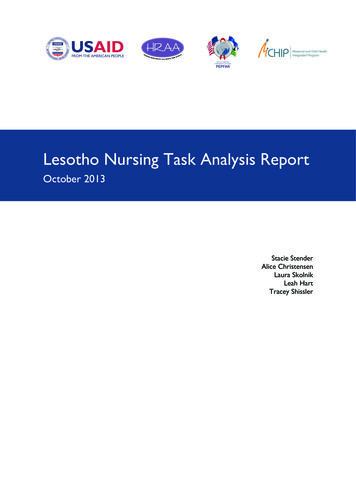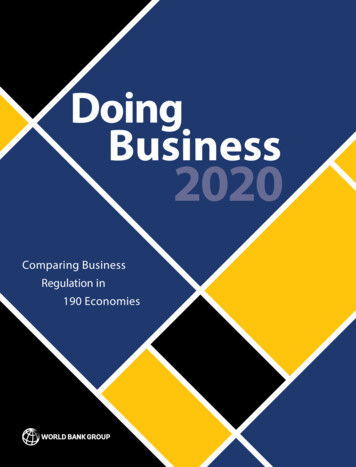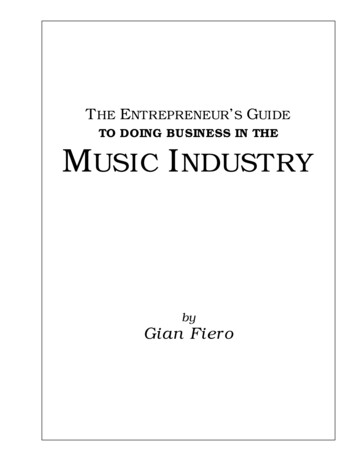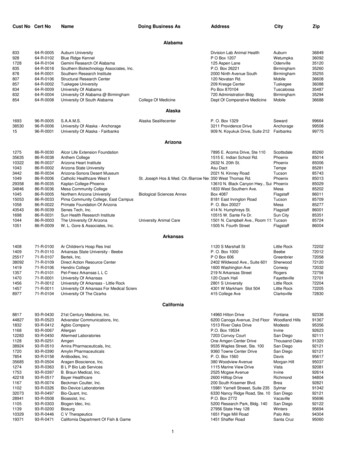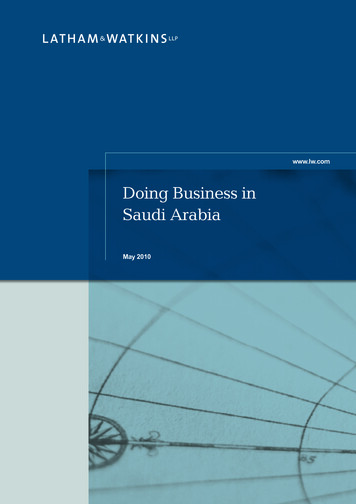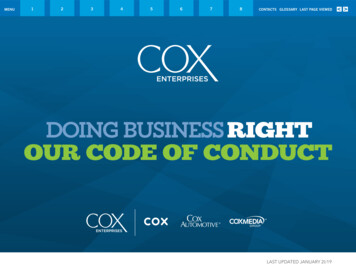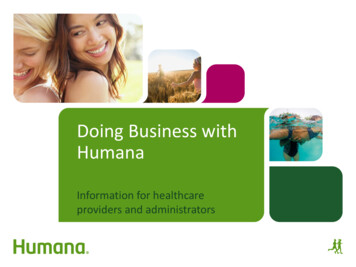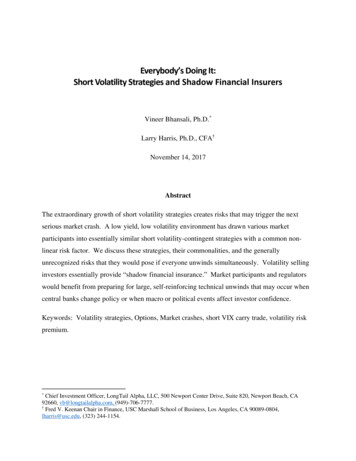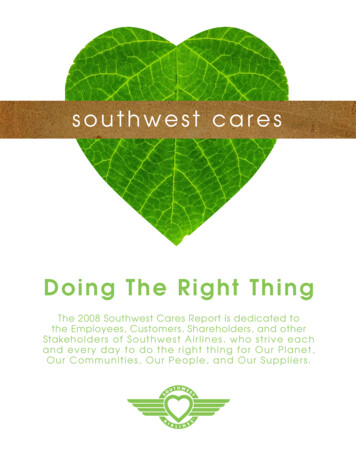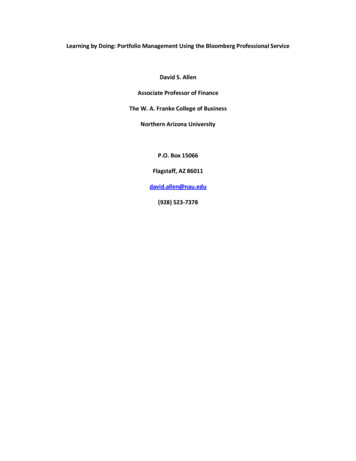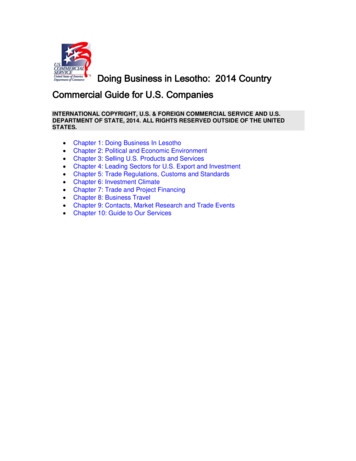
Transcription
Doing Business in Lesotho: 2014 CountryCommercial Guide for U.S. CompaniesINTERNATIONAL COPYRIGHT, U.S. & FOREIGN COMMERCIAL SERVICE AND U.S.DEPARTMENT OF STATE, 2014. ALL RIGHTS RESERVED OUTSIDE OF THE UNITEDSTATES. Chapter 1: Doing Business In LesothoChapter 2: Political and Economic EnvironmentChapter 3: Selling U.S. Products and ServicesChapter 4: Leading Sectors for U.S. Export and InvestmentChapter 5: Trade Regulations, Customs and StandardsChapter 6: Investment ClimateChapter 7: Trade and Project FinancingChapter 8: Business TravelChapter 9: Contacts, Market Research and Trade EventsChapter 10: Guide to Our Services
Return to table of contentsChapter 1: Doing Business in Lesotho Market OverviewMarket ChallengesMarket OpportunitiesMarket Entry StrategyMarket OverviewReturn to top Lesotho, with a population of 1.88 million, is geographically surrounded by andeconomically integrated with South Africa, from which it receives approximately 80percent of its imports for final consumption. Lesotho held free, fair, and transparent general elections in May 2012, in which athree party coalition government, the first in Lesotho’s history, ousted the rulingparty. The election marked Lesotho’s first democratic and peaceful transition ofpower between political parties since its independence. In response, Freedom Houseraised Lesotho’s political rights rating from “partially free” to “free” in its 2013Freedom in the World Report, and Fitch upgraded its sovereign credit outlook forLesotho to stable, citing ongoing improvements in public finance management andstructural reforms. In 2014, Lesotho moved up 3 places from 139 to 136 in the World Bank’s DoingBusiness Report. Lesotho made marked improvement in the area of registeringproperty, moving up 69 places. The Land Act of 2010 and the establishment of theLand Administration Authority have made transferring property easier by streamliningprocedures and increasing administrative efficiency. Lesotho is a member of the Southern African Customs Union (SACU), and as such,does not pay tariffs to export goods to other SACU members (Botswana, Namibia,South Africa, and Swaziland). With the exception of Botswana, these countries alsoform a common currency and exchange control area known as the CommonMonetary Area (CMA). The South African rand can be used interchangeably withLesotho’s currency, the loti, since the loti is pegged one to one (1:1) to the SouthAfrican rand. The loti-rand peg provides some level of economic stability, and theGovernment Lesotho also has a record of pursuing prudent macroeconomic policies. Lesotho gets most of its foreign exchange through earnings from the SouthernAfrican Customs Union (SACU), water exports to South Africa, and, to a decreasingextent, remittances from migrant laborers employed in South Africa. Lesotho has relatively low inflation, around 5.4% at the end of 2013. The economy ismostly export driven; major export products are garments, diamonds, water,electricity, wool and mohair. The major economic sectors are manufacturing, mining,agriculture and services.
Lesotho is one of the top ten exporters to the United States under the African Growthand Opportunity Act (AGOA). U.S. total trade (exports plus imports) with Lesothowas 358.9 million in 2013. The U.S. is the second largest recipient of Lesotho’s exports, mostly garmentsexported under AGOA. The table below shows percentages of Lesotho’s exports byregion of destination.Destination of Lesotho’s Exports in 2013SACUUnited StatesEuropeRest of the WorldDestination of Lesotho’s Exports in 201335.7%34.5%27.8%2% Lesotho is also a member of the Southern Africa Development Community (SADC).The SADC Free Trade Area (FTA), launched in 2008 and fully implemented withinthe 12 SADC member states in 2012, provides foreign investors easier access to theregional market. SADC also has signed an economic partnership agreement with theEuropean Union, giving Lesotho duty and quota free access to the European marketfor its products. Double taxation agreements exist with South Africa, Mauritius, the United States ofAmerica, and the United Kingdom.Market ChallengesReturn to top Lesotho is completely landlocked by South Africa, and therefore businesses inLesotho can only access world markets using South African ports and otherinfrastructure. Given its small economy and geography, Lesotho would greatlybenefit from deeper regional economic integration via SACU and SADC. Employers often cite low productivity, especially in the manufacturing sector, as oneof their major challenges in operating in Lesotho. The impact of the HIV epidemic isalso a serious challenge for employers and employees alike. Some employers in thegarment industry have overcome this challenge by having a medical clinic on site sothat workers do not need to take as much leave for regular medical treatment. The business community in Lesotho also cites the lack of adequate physicalinfrastructure, such as good road infrastructure, electricity, and water and sewerservices as a serious challenge to operating in Lesotho.Market Opportunities Return to topThe 1.75 billion Lesotho Highlands Water Project (LHWP) Phase II, a dam andwater transfer scheme, was launched by the governments of Lesotho and SouthAfrica in 2014. The project offers opportunities for U.S. businesses in engineering
services, and construction. Solicitation of tenders for feasibility studies, roads, anddam and tunnel construction is expected to start in 2015. More information on theproject can be found at http://www.lhwp.org.ls/phase2/index.html. Lesotho meets approximately 50% of its maximum energy needs withhydroelectricity. The Government plans to expand hydropower capacity under LHWPPhase II and establish wind farms, offering the prospect of an entirely green energyeconomy within this decade. Lesotho has the potential to supply the Southern Africagrid with its excess power generation. The population primarily lives in small, ruralcommunities which make them a good market for solar energy. The Government isalso interested in taking advantage of carbon credits. There are opportunities fortechnical experts in energy generation and distribution. Lesotho imports almost all of its manufacturing inputs and consumer goods. Itsprimary resources - diamonds, water, wool, and mohair - are exported unprocessed.Opportunities exist to introduce new consumer goods and invest in manufacturing forboth local and international markets. Tourism is one of the sectors that have significant employment potential; however itis not fully exploited. Lesotho is one of the most pristine and unspoiled naturalenvironments in the region, with spectacular scenery and a huge potential for ecotourism. The rugged countryside makes Lesotho ideal for off-road sports; Lesothohosts the “Roof of Africa” motorcycle rally every year. It has the world’s longestcommercial single-drop abseil at 204m. Other outdoor sports include: canoeing, skiruns, horseback rides, pony trekking, mountain climbing, hiking, fishing, andcamping. The Government is interested in attracting more U.S. tourists and U.S.investment in the tourism sector. There are opportunities for U.S. business in franchising, such as restaurants,services, and retail shops. Opportunities in commercial agriculture include trout farming, livestock, andhorticulture.Market Entry StrategyReturn to topFor U.S. businesses interested in doing business in Lesotho, it is important to have localpresence by establishing branch offices, pursuing joint ventures with local businesses, ormaking use of sales agents. It is worthwhile to establish business relationships beforetender opportunities are announced. U.S. firms should seek local partners with anexisting reputation in their line of business or a complementary business. For instance,the Lesotho Highlands Water Commission has mentioned that preference for LHWPPhase II tenders will be given to Lesotho, South Africa, and SADC contractors. U.S.businesses interested in this project are encouraged to form joint ventures with local andregional companies in order to benefit from the tenders in this multi-million project.Personal meetings with potential agents are encouraged, and due diligence isrecommended to ensure that partners are reliable. The U.S. Embassy encouragesprospective U.S. investors to contact the Lesotho National Development Corporation(LNDC), which plays a facilitating role for foreign investors, providing information to
prospective investors, arranging for site visits, helping with registration and licensing,and securing premises.In addition to information in this Country Commercial Guide, the U.S. CommercialService office in Johannesburg offer many services designed to assist U.S. investors indeveloping their market entry strategy and to facilitate export experience in Lesotho. Fora detailed description of these services, please .companies/index.aspReturn to table of contents
Return to table of contentsChapter 2: Political and Economic EnvironmentFor background information on the political and economic environment of the country,please click on the link below to the U.S. Department of State Background urn to table of contents
Return to table of contentsChapter 3: Selling U.S. Products and Services Using an Agent or DistributorEstablishing an OfficeFranchisingDirect MarketingJoint Ventures/LicensingSelling to the GovernmentDistribution and Sales ChannelsSelling Factors/TechniquesElectronic CommerceTrade Promotion and AdvertisingPricingSales Service/Customer SupportProtecting Your Intellectual PropertyDue DiligenceLocal Professional ServicesWeb ResourcesUsing an Agent or DistributorReturn to topForeign investors are represented in the market either through their own branch officesor through authorized agents or distributors. Distributors provide technical support to endusers and usually have contractual arrangements with their principals. An agent of aforeign firm must be a Lesotho citizen per the Trading Enterprises Regulations of theTrading Enterprises Order No 40 of 1993.Establishing an OfficeReturn to topTo open a foreign representative office in Lesotho, the firm must first establish itself as alegal entity by registering with proper authorities. The One-Stop Business FacilitationCentre has reduced the time and cost of doing business in Lesotho by housing in oneplace the various government departments and agencies involved in the registration andlicensing of businesses. For registration, the following documents must be submitted:1) a letter of intent to do business in Lesotho;2) a letter of appointment from the company’s headquarters;3) the resume of the company’s representative; and4) a work permit and proof of identity.Representative offices for construction, engineering, or related consulting fields arerequired to register with the Ministry of Public Works and Transport.For more information on establishing an office in Lesotho, contact the OBFC at:
Director OBFC and Registrar of CompaniesOne-Stop Business Facilitation CentreMinistry of Trade and Industry, Marketing & CooperativesP.O. Box 747Maseru 100Telephone: (266) 22326647Fax: (266) 22310326Website: www.obfc.org.lsFranchisingReturn to topFranchising is one business model that has not been explored to its maximum potentialin Lesotho. Franchises successfully operate in the sectors of fast food, clothing, officecleaning, motor dealers and repairs, insurance companies, and fuel. A few successfulAmerican franchises operate in Lesotho, including Avis Car Rental, Wal-Mart (Game),Federal Express, Coca-Cola, and Kentucky Fried Chicken. There is potential for otherU.S. companies, both retail and service-oriented, to expand through franchising. TheU.S. Embassy recommends consulting the OBFC for details on how to set up afranchise in Lesotho.Direct MarketingReturn to topDirect marketing is used in Lesotho for many kinds of products, from insurance tohousehold equipment. Companies such as Avon, Amway, and Herbalife have built largebusinesses by direct marketing through local distributors. There are companies that offervarious marketing and advertising services. The U.S. Embassy, through the commercialservices offered to U.S. companies, can help identify reputable companies that offermarketing and advertising services.Joint Ventures/LicensingReturn to topJoint ventures, especially for large projects, are common. Joint ventures are eitherformed for limited periods, such as for a specific construction contract, or can be longterm ventures, such as in the mining industry. To start a joint venture or acquirea licenseto operate in Lesotho, a foreign investor must register with the OBFC. The LNDC alsoplays a facilitating role for foreign investors, providing information to prospectiveinvestors, arranging for site visits, and helping with permits and licenses as well ascertain operational problems. For more information on how LNDC can help with jointventures and licensing, please visit: http://www.lndc.org.ls.Selling to the GovernmentReturn to topForeign firms may fully participate in government procurement; however, they have tofirst register as legal entities, applying for trading licenses, and register with the LesothoRevenue Authority for tax purposes. Lesotho is not a signatory to the WTO Agreementon Government Procurement, which means that it is not bound by conditions prohibitingspecification of locally-made products in tenders. The Public Procurement Regulations2007 has decentralized public procurement to line ministries, with each contractingauthority operating its own tender panel, which is responsible for the decision on the
award of contract. The Procurement Policy and Advisory Division (PPAD), under theMinistry of Finance, is the regulatory body with overall responsibility on Lesotho's publicprocurement regime. In evaluating proposals, the procurement unit grants a margin ofpreference for nationals as follows: 15% to a local business with a majority shareholding of at least 51%;10% to (a) a business owned between 30% and 50% by Lesotho nationals, (b) atenderer bidding to supply goods of Lesotho origin, (c) a tenderer performing atleast 50% of the contract in Lesotho and using and developing the capacity ofBasotho staff, (d) a tenderer subcontracting at least 50% of the contract to one ormore Basotho businesses, (e) a tenderer that has the largest use of locallyproduced goods, materials, and services, or (f) a tenderer employing the largestshare of local labor; and5% to a business owned between 10% and 30% by Lesotho nationals.According to the Lesotho Highlands Water Commission, for the LHWP Phase IIpreference for tenders will be given to Lesotho, South Africa, and SADC contractors.Companies from other countries will be considered when a specific skills set is notavailable locally or regionally.There is no central online publication or website where government tenders areadvertised. U.S. businesses interested in the Lesotho government tenders shouldregularly check local and South African newspapers.Distribution and Sales ChannelsReturn to topDistribution channels are in the form of distribution and sales outlets throughout thecountry. South African firms dominate the retail and wholesale sector. Mostmanufactures distribute their products to wholesalers in Lesotho, who distribute goods toretailers through their chain outlets across the country. Other manufacturers have salesagents who have bonded warehouses to store the products, which are later dispatchedto retailers.Lesotho has air, road, and railway links to South Africa. Distributors use any of thesemodes to transport products from manufacturers to wholesalers or sales agents inLesotho.Value Added Tax (VAT) at the rate of 14% is levied at every stage from producer toconsumer, but the final burden is borne by the consumer since producers are allowed toclaim back input VAT.Selling Factors/TechniquesReturn to topPurchasing power is significantly concentrated in urban areas, while the majority of thepopulation (80%) lives in rural areas. The majority of Basotho in urban areas areinterested in quality, but price still plays a more important role in the purchase decision.Overall, U.S. products are well accepted in the market and are considered of goodquality; however, in many instances they must compete against lower priced products,especially from Asia. In order to compete effectively, American companies should fosterclose relationships and maintain regular communication with representatives, agents,
and distributors of their products. A close relationship allows the supplier to keep abreastof the changes and developments in local market conditions and assess thecompetitiveness of its products. Frequent training and support for after-service activitiesare also key elements of the success.There is growing brand awareness, which makes it important for American companiesentering the Lesotho market to register their brand names with the Registrar General’soffice. Companies should also be prepared to invest in marketing to promote theirbrands.Electronic CommerceReturn to topElectronic commerce is not widely used in Lesotho; a small - but growing - percentage ofthe population has access to the Internet. The Ministry of Communications hasdeveloped proposals for electronic commerce to be more widely developed. Electronicfunds transfers are limited to 11,000 per transaction for transfers to local bankaccounts, while for external bank accounts the limit is roughly 500,000.Trade Promotion and AdvertisingReturn to topRadio, television, newspaper, billboards, and sponsored sports events advertising arethe most common promotion tools for new and existing products and services. Socialmedia and e-mail marketing is becoming increasingly popular, especially for services.PricingReturn to topPrices are generally market-determined. The major exceptions are petroleum products,electricity, and water, whose prices are regulated by the government. U.S. firms shouldconduct their own market research to obtain consumer preferences, cost of delivery,distribution, and advertising. Price is best developed with advice from local distributorswho are well attuned to the competitive factors at play in specific markets. A standard14% VAT is levied on all goods and services, while a 15% VAT is levied on alcoholic andtobacco products.Sales Service/Customer SupportReturn to topThere is no government policy that requires businesses to provide customer supportafter initial sale/service. However, several companies provide full technical support forup to a year.Protecting Your Intellectual PropertyReturn to topLesotho’s Industrial Property Order (1989), Copyright Order (1989), and IndustrialProperty Regulations (1989) are the bases for legal protection of intellectual propertyrights. Patents have rarely been issued in Lesotho, but trademark protection is widelysought and granted. Lesotho is a member of World Intellectual Property Organization(WIPO) and the African Regional Intellectual Property Organization.Protecting Your Intellectual Property in Lesotho:
Several general principles are important for effective management of intellectualproperty (“IP”) rights in Lesotho. First, it is important to have an overall strategy toprotect your IP. Second, IP is protected differently in Lesotho than in the U.S. Third,rights must be registered and enforced in Lesotho, under local laws. Your U.S.trademark and patent registrations will not protect you in Lesotho. There is no suchthing as an “international copyright” that will automatically protect an author’s writingsthroughout the entire world. Protection against unauthorized use in a particular countrydepends, basically, on the national laws of that country. However, most countries dooffer copyright protection to foreign works under certain conditions
dam and tunnel construction is expected to start in 2015. More information on the . diamonds, water, wool, and mohair - are exported unprocessed. . Amway, and Herbalife have built large businesses by direct marketing t
